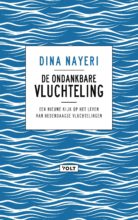Eternal gratitude. Is that what is expected from a refugee? How long can you stay grateful, and how do you show your gratitude? And if you do not show your gratitude, will you be sent back to… well, to where?

In The Ungrateful Refugee (translated by Susan Ridder into De ondankbare vluchteling for Volt Publishers), Dina Nayeri – herself a refugee from Iran – uses her first work of nonfiction to acquaint readers with the pain and horrors refugees face – not only before, but also after they settle in a safe place. She shares the story of her own life as a refugee and the experiences of refugees from other countries. And she robustly challenges the perceived obligation on the displaced person to revoke or disavow their former identity; to assimilate, to be a “good investment” for whichever country that has admitted them.
Nayeri shows how refugees become enmeshed in a community, how they live, what they suffer, and how a single moment of displacement can shape everything that comes after. Her story is about the struggle for acceptance in a society where discrimination is rampant. After all, despite moments of joy and a sense of community, the story does not necessarily have a happy end the moment asylum is granted. “The Ungrateful Refugee is a unique, deeply thought-out refugee saga perfect for our moment”, according to Kirkus Reviews. The book was recently nominated for the Kirkus Prize 2019.
Join us for a provocative evening with Dina Nayeri about human dignity in times of mass migration.

With special thanks to VluchtelingenWerk Nederland.
We have added an “opening act” to this event: Nilgun Bayraktar is assistant professor of film and visual culture at California College of the Arts and currently a research fellow at NIAS in Amsterdam. In her work, she explores cinematic and artistic representations of migration. She states that the dominant Eurocentric perspective reductively views these migrant and refugee crossings as violations of European borders, portraying refugees as “criminals” or voiceless “victims.” In her multimedia presentation on this evening, Bayraktar will explore recent cinematic and artistic works that activate multidirectional memories and alternative futures to counter and disrupt the “crisis” labeling and the sense of urgency and tragedy it evokes.





